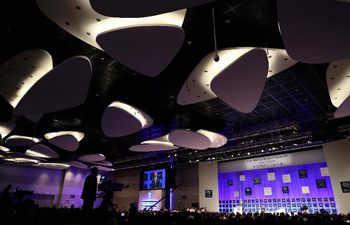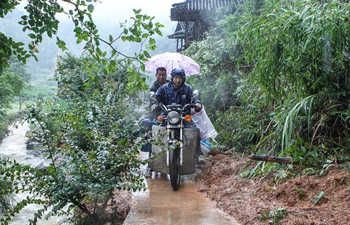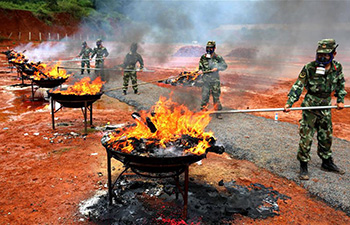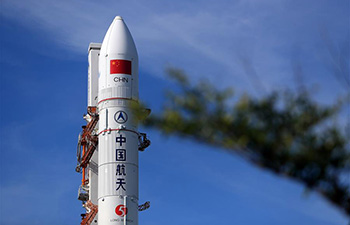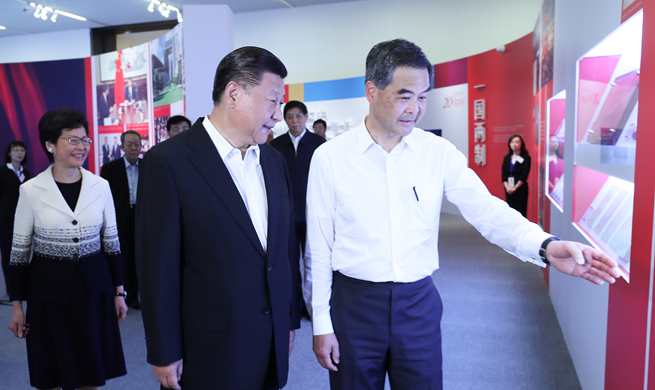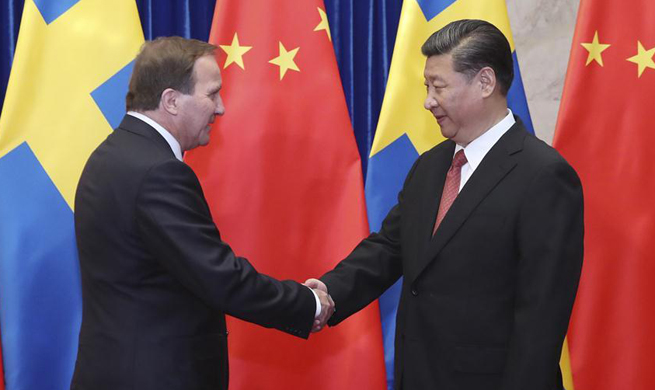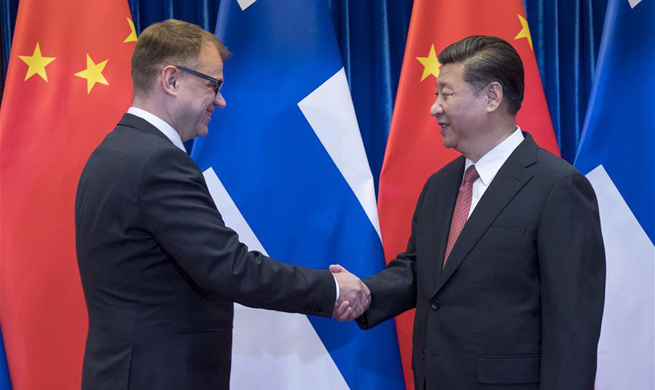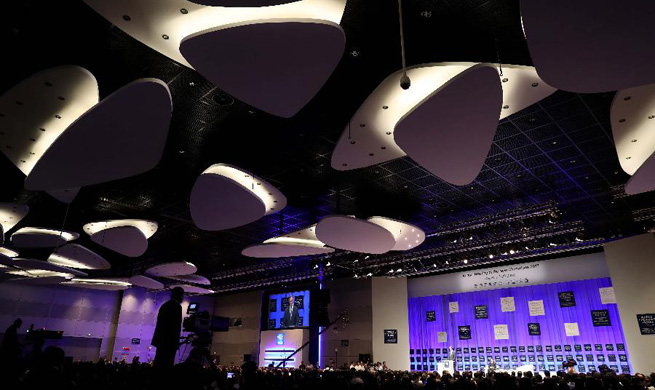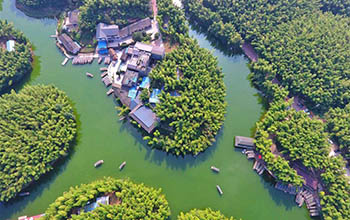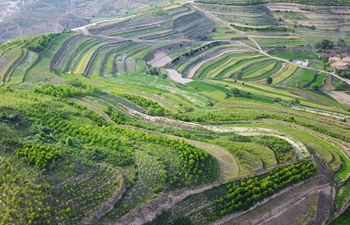BEIJING, June 27 (Xinhua) -- As a victory on counter-terrorism in Syria and Iraq is in sight, people in the Middle East, rather than cheering up, started to worry about more intense conflicts that could involve most of the regional countries.
The Iraqi government and military forces in Syria are expected to retake Mosul in weeks and Raqqa in months, a devastating blow to the Islamic State (IS) group that seized large swaths of territories in the region and launched deadly attacks across the world in the past few years.
However, victories could be temporary due to military intervention of world and regional powers and negligence of unbalanced economic and social development, said observers, who insisted inclusive diplomatic efforts will help build long-lasting peace.
POSSIBLE CONFLICTS
After suffering years of terrorist attacks, people in Syria are waiting for the liberation of their homes from the Islamic State. However, they may have to wait longer to see peace in the country, as foreign military intervention could spark more conflicts.
"There is an unfortunate option. We may have a war of all against all, a very unstable situation and continued state crisis. All concerned player fight against each other. Complication, like what we see currently with Qatar, a fighting inside the Arab world, and also between the Arab world and outside powers, would engage external players which are trying to make tactical gains," Andrey Kortunov, director general of the Russian International Affairs Council, said at the World Peace Forum held in Beijing over the weekend.
Saudi Arabia, the United Arab Emirates, Egypt and several other countries severed ties with Qatar early this month, accusing Doha of supporting terrorism and maintaining ties with Iran, an arch foe of the Gulf kingdoms, a move that experts said aims to force Qatar to stand firmly with the Arab world in post-IS power struggle, especially in Syria.
The Qatari government has denied the accusations and recently rejected demands of Saudi-led countries to restore relations. The four Arab countries set a deadline on Friday, giving Qatar 10 days to comply with 13 demands including severing diplomatic ties with Iran, curb relations with the Muslim Brotherhood, and closing a Turkish military base.
In the past several months, Turkey, which insisted departure of Syrian President Bashar Assad and is hostile to Kurdish forces, deployed more troops in Iraq and Syria. The Syrian Democratic Forces, a Kurdish-dominated ally of the United States in toppling the Assad regime and fighting terrorist in Syria, have almost besieged Raqqa, IS's de facto capital. Shiite militia in Iraq and Syria, with support of Russia and Iran, have mobilized to border regions, ready to assist Syrian government forces on the ground.
"It (intervention) will do damage to the long-term solutions. It is the worst possible scenario but unfortunately very likely. If we do not act now, in a couple of years, I think this scenario will become likely," Kortunov said.
"The best solution to me, which you may consider unrealistic at this stage, is to develop a collective security system with enforcement mechanism. Something that is guaranteed by the United Nations Security Council, with mechanism of sanctions in place...I understand it is difficult, but I don't think there is a better solution," he added.
INTERVENTION & TERRORISM
For the past few decades, the western countries led by the United States adopted Middle East policies of securing flow of oil and allies like Israel, Saudi Arabia, Egypt and Turkey, through economic or military means.
However, the White House converted its policy after 9/11 attacks towards military interventions, crashing Taliban in Afghanistan and toppling Saddam Hussein in Iraq.
The military intervention by the United States, its NATO and Arab allies enlarged after 2011 when turmoil broke out in many Middle East countries. Libya, Syria and Yemen slipped into civil war one after another due to the intervention. At the same time, global terrorism based in the Middle East ripped through the world, leaving thousands of people killed and more wounded.
Military intervention did not contain terrorism, but led to the rise of terrorism and extremism as a result.
The U.S. troops invaded Iraq in 2003 and overthrew the Saddam regime which thoroughly destroyed Iraq's political and social system. Politicians, militia, and religious leaders, supported by Washington and regional countries, struggled for power at the expense of security and stability in the country.
The al-Qaida group established its Iraqi branch, taking the advantage of power vacuum, and later gave birth to the Islamic State which occupied large swaths of territories in Iraq and neighboring Syria, and staged terrorist attacks across the world.
The U.S. military intervention did not bring peace to Afghanistan, nor contain terrorism and extremism, former Afghan President Hamid Karzai said at the forum.
In the past 16 years, the United States and its NATO allies stayed in Afghanistan in the name of counter-terrorism, he said, but it is strange that the longer they stayed, the more active terrorism and extremism groups became in the country.
We need to abandon policies of confrontation in tackling terrorism and extremism as some countries used terrorism and extremism as tools for their own interests, Karzai said, adding that diplomatic efforts on inclusive cooperation is a better way than military intervention in countries like Afghanistan, Iraq, Syria to end conflicts.
INTERNATIONAL COOPERATION
Observers said rather than intervention, the world community should focus on eradicating roots of terrorism which requires justice, equity and balanced economic and social development.
So far, international cooperation in anti-terrorism should focus on three main areas, including reaching consensus on the definition of terrorism, sharing intelligence, and extradition, former Turkish Foreign Minister Yasar Yakis said at the forum.
He stressed that instead of striking only terror attacks, it would be essential to wipe out the roots of terrorism, including marginalization and discrimination, which would take more time and efforts.
As military intervention has huge impact on radicalizing people, efforts on achieving common development and respecting different civilizations and religions seem an alternative for global governance.
"What is often missed from the picture is that we cannot separate issues of security and issues of development. Because if we only deal with security, and forget about development, our resolves on social and economic development will generate new political arrogance," Kortunov said.
"You can fix something, but if the unemployment rate is as high as it is right now among the younger generation...the low level of urbanization...our attempts to fight terrorism will not have lasting impact. It is only temporary," he added.
He also called on more countries which can assist Syria and Yemen in humanitarian and reconstruction to participate in the reconciliation process.
In this regard, Director of the French Institute for International and Strategic Affairs Pascal Boniface urged for trust building between the rival blocs.
"I think we need confidence building measures. Even during the Cold War, the Soviet Union and the United States were able to discuss security matters...So we are able at this time to launch confidence building measures to exchange information on troops. Maybe it is an example to defuse the debate on the tensions," Boniface said.





